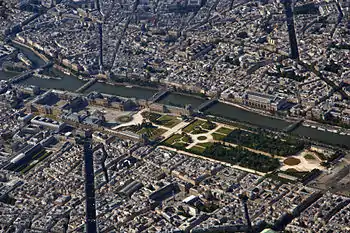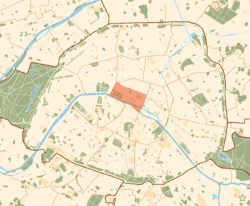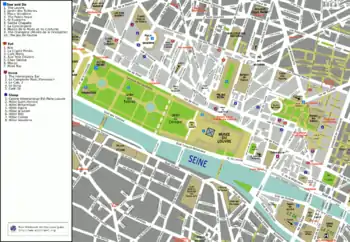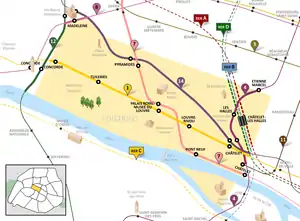1st arrondissement of Paris
The 1st arrondissement of Paris (Ier arrondissement) is one of the 20 arrondissements of the capital city of France. In spoken French, this arrondissement is colloquially referred to as premier (first/the first).
1st arrondissement of Paris
Ie arrondissement | |
|---|---|
 | |
 Paris and its closest suburbs | |
| Country | France |
| Region | Île-de-France |
| Department | Paris |
| Commune | Paris |
| Government | |
| • Mayor | Ariel Weil |
| Area | |
| • Total | 1.83 km2 (0.71 sq mi) |
| Population (2017-01-01)[1] | |
| • Total | 16,266 |
| • Estimate (2005) | 17,700 |
| • Density | 8,900/km2 (23,000/sq mi) |
| 1 Population sans doubles comptes: single count of residents of multiple communes (e.g. students and military personnel). | |
 Paris Coat of Arms 20 arrondissements of Paris | |||||||||||||||||||||||||||||||||||||
|---|---|---|---|---|---|---|---|---|---|---|---|---|---|---|---|---|---|---|---|---|---|---|---|---|---|---|---|---|---|---|---|---|---|---|---|---|---|
| |||||||||||||||||||||||||||||||||||||
Also known as Louvre, the arrondissement is situated principally on the right bank of the River Seine. It also includes the west end of the Île de la Cité. The locality is one of the oldest areas in Paris, the Île de la Cité having been the heart of the city of Lutetia, conquered by the Romans in 52 BC, while some parts on the right bank (including Les Halles) date back to the early Middle Ages.
It is the least populated of the city's arrondissements and one of the smallest by area, with a land area of only 1.83 km2 (0.705 sq. miles, or 451 acres). A significant part of the area is occupied by the Louvre Museum and the Tuileries Gardens. The Forum des Halles is the largest shopping mall in Paris.[2] Much of the remainder of the arrondissement is dedicated to business and administration.
Demography
The area now occupied by the first arrondissement attained its peak population in the period preceding the re-organization of Paris in 1860. In 1999, the population was 16,888, while the arrondissement hosted 63,056 jobs, making it one of the most active for business after the 2nd, 8th, and 9th.
Historical population
| Year (of French censuses) |
Population | Density (inh. per km²) |
|---|---|---|
| 1861 (peak of population)¹ | 89,519 | 49,025 |
| 1872 | 74,286 | 40,593 |
| 1954 | 38,926 | 21,271 |
| 1962 | 36,543 | 20,013 |
| 1968 | 32,332 | 17,706 |
| 1975 | 22,793 | 12,482 |
| 1982 | 18,509 | 10,136 |
| 1990 | 18,360 | 10,055 |
| 1999 | 16,888 | 9,249 |
| 2009 | 17,614 | 9,692 |
¹The peak of population actually occurred before 1861, but the arrondissement was created in 1860, so there are no figures before 1861.
Immigration
| Born in Metropolitan France | Born outside Metropolitan France | |||
|---|---|---|---|---|
| 77.8% | 22.2% | |||
| Born in Overseas France |
Born in foreign countries with French citizenship at birth1 | EU-15 immigrants2 | Non-EU-15 immigrants | |
| 0.8% | 4.6% | 7.1% | 19.7% | |
| 1 This group is made up largely of former French settlers, such as pieds-noirs in Northwest Africa, followed by former colonial citizens who had French citizenship at birth (such as was often the case for the native elite in French colonies), and to a lesser extent foreign-born children of French expatriates. Note that a foreign country is understood as a country not part of France in 1999, so a person born for example in 1950 in Algeria, when Algeria was an integral part of France, is nonetheless listed as a person born in a foreign country in French statistics. 2 An immigrant is a person born in a foreign country not having French citizenship at birth. Note that an immigrant may have acquired French citizenship since moving to France, but is still considered an immigrant in French statistics. On the other hand, persons born in France with foreign citizenship (the children of immigrants) are not listed as immigrants. | ||||
Quarters
Each of the 20 Paris arrondissements is divided into four-quarters (quartiers). The table below lists the four-quarters of the 1st arrondissement:
figures from 1999 French census
| Quarter | Population | Land area (in km²) |
Density (inh. per km²) |
|---|---|---|---|
| Quartier Saint-Germain-l'Auxerrois | 1,670 | 0.871 | 1,917 |
| Quartier Les Halles | 8 980 | 0.412 | 21,796 |
| Quartier Palais-Royal | 3,190 | 0.279 | 11,434 |
| Quartier Place Vendôme | 3,040 | 0.270 | 11,259 |
Economy
Korean Air's France office is in the 1st arrondissement.[3]
At one time Air Inter's head office was located in the first arrondissement.[4] When Minerve, an airline, existed, its head office was in the first arrondissement.[5]
Education
In terms of state-operated schools, the first arrondissement has two nursery schools (écoles maternelles), two primary schools (écoles élémentaires), one école polyvalente, one high school (collège), and one sixth-form college (lycée).[6]
The state-operated nursery schools are École Maternelle Auxerrois and École Maternelle Sourdiere.[6] The state-operated primary schools are École Élémentaire Arbre Sec and École Élémentaire D'Argenteuil.[6][7] The arrondissement has one école polyvalente, École Polyvalente Cambon.[8] Collège Jean-Baptiste Poquelin is the sole state-operated high school in the arrondissement.[9] Lycée Professionnel Commercial Pierre Lescot is the sole state-operated sixth-form college in the first arrondissement.[10] Private primary and secondary institutions in the arrondissement include École Élémentaire Privée Notre-Dame-Saint-Roch, École du 2nd Degré Professionnel Privée Pigier, and École Technologique Privée de Dessin Technique et Artistique Sornas.[6]
Map

Cityscape
Places of interest

- Arc de Triomphe du Carrousel, at the eastern end of the Axe historique ("grand historic axis")
- Banque de France headquarters
- Comédie-Française
- Crédit Foncier de France historical headquarters
- The Louvre
- Galerie Véro-Dodat
- Les Halles
- Musée des Arts Décoratifs
- Musée du Barreau de Paris
- Musée Grévin – Forum des Halles
- Musée des Lunettes et Lorgnettes Pierre Marly
- Palais Royal
- Hôtel de Vendôme
- Hôtel de Rambouillet (former building)
- Hôtel Ritz Paris
- La Sainte-Chapelle
- La Samaritaine
- Tuileries Garden
Bridges
Streets and squares
- Avenue de l'Opéra (partial)
- Rue de Rivoli (partial)
- Place Vendôme and the Vendôme Column
See also
- Street Names of Paris, 1er arrondissement
References
- "Populations légales 2017". INSEE. Retrieved 6 January 2020.
- "Les Halles in Paris. Forum des Halles". Paris Digest. 2018. Retrieved 20 November 2018.
- "Aperçu / Info de Contact." Korean Air. Retrieved 30 August 2011. "Sièges en Europe 9 boulevard de la Madeleine 75001 Paris France"
- "Direction des Bases Aeriennes Archived 20 July 2011 at the Wayback Machine." Direction Générale de l'Aviation Civile. March 1975. 22/28. Retrieved 26 June 2010.
- "World Airline Directory." Flight International. 14–20 March 1990. 11.
- "Rechercher un établissement Archived 4 December 2011 at the Wayback Machine." Académie Paris. Retrieved 25 October 2011.
- "Les mentions légales :." École Élémentaire Arbre Sec. 14 February 2008. Retrieved 15 October 2011. "Adresse postale : Ecole Arbre sec 19, rue de l'Arbre sec 75001 Paris"
- "Accueil Archived 31 October 2011 at the Wayback Machine." École Polyvalente Cambon. Retrieved 25 October 2011. "28 rue Cambon 75001 Paris"
- "Accueil Archived 7 November 2011 at the Wayback Machine." Collège Jean-Baptiste Poquelin Retrieved 25 October 2011. "6, rue Molière - 75001 PARIS"
- "Contact." Lycée Professionnel Commercial Pierre Lescot. Retrieved 25 October 2011. "35 Rue des Bourdonnais, 75001 PARIS"
External links
| Wikimedia Commons has media related to Paris 1er arrondissement. |
![]() 1st arrondissement travel guide from Wikivoyage
1st arrondissement travel guide from Wikivoyage